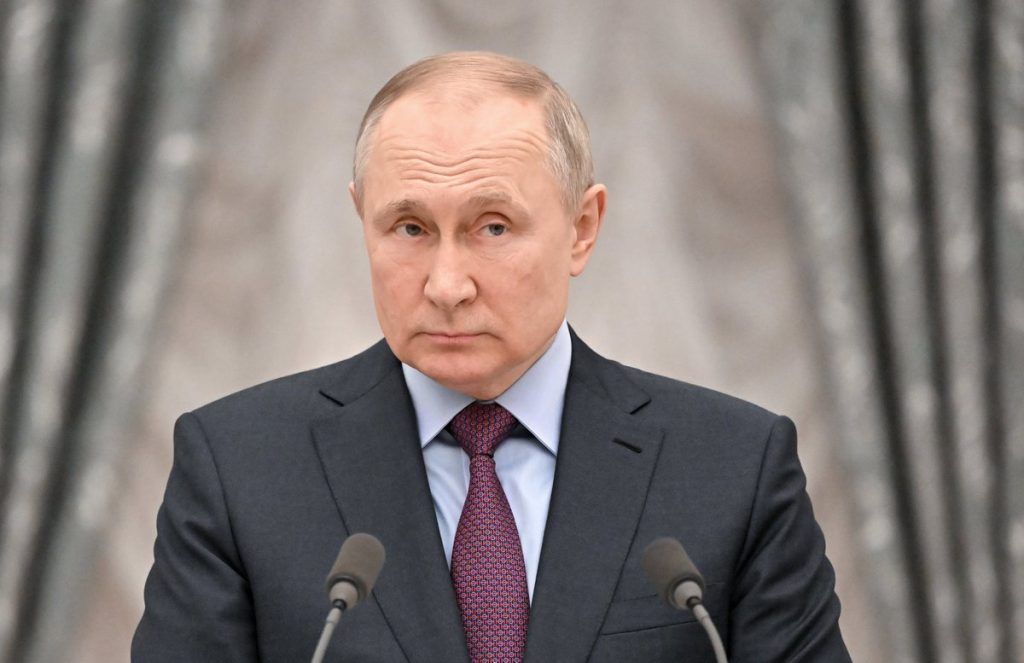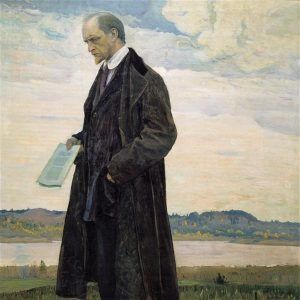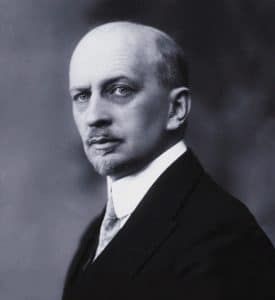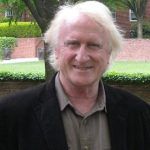Inside Putin’s head: Paranoid? Calculating? Obsessed by the conspiracy theories of a rehabilitated Russian fascist?
By Charles B. Strozier, David M. Terman | March 3, 2022
 President Vladimir Putin of Russia, as seen on the official Twitter page of the Kremlin dated February 22, 2022. Credit: President of the Russian Federation | CC BY 4.0
President Vladimir Putin of Russia, as seen on the official Twitter page of the Kremlin dated February 22, 2022. Credit: President of the Russian Federation | CC BY 4.0
Putin has raised the alert status of Russia’s nuclear weapons, to the astonishment of foreign policy experts in the West. It is a great gamble and risks not only accident but retaliation for relatively minor setbacks in the war in Ukraine. Not since the Cold War has such an apocalyptic threat existed.
This danger is heightened by the nature of today’s Russia. It is clear in Russia’s autocracy that Putin, and Putin alone, can decide whether to unleash missiles armed with nuclear weapons.
To try to figure out the psychology of a leader is a daunting task, especially when dealing with one who plays his cards as close to his chest as Putin. He could simply be raising the alert status of Russia’s nuclear weapons as an extension of his propaganda campaign—in other words, a huge act of misinformation. To the extent this is true, it would be best for the United States not to overreact. Raising the alert status of our own weapons, for example, could well heighten the risk of a nuclear accident.
The more ominous conclusion, however, that we draw from our observation of Putin’s behavior is that it fits logically into what appears to be a disintegration of his personality. Always grandiose to a fault, Putin appears in recent years to have surrounded himself with yes-men who applaud his vision for a recovery of Russia’s imagined greatness and feed his fantasies of Western—especially American—conspiratorial intentions. He has throttled the press and cut off dissent, which limits the marketplace of alternate ideas. Putin is the new Leader, the great one who alone possesses the ability to carve out an exalted history for Russia.
The framework of what we would term this paranoid and fascist worldview was articulated by the mid-20th century White Russian émigré and Nazi apologist, Ivan Ilyin. (Yale University historian Timothy Snyder, author of a number of articles and books on Ukrainian, Russian, and Soviet history, brought the significance of Ilyin’s thought and work to our attention—especially Ilyin’s impact on Putin.) Ilyin wrote numerous books that specified a fascist political order in which Russia was seen as a historical innocent surrounded by evil. According to Ilyin, it is Russia’s mission to safeguard civilization and the “good” by producing a great Leader who will save Russia and vanquish the evil other—the West. In a 2015 Foreign Affairs article about Ilyin titled “Putin’s Philosopher,” the authors Anton Barbashin and Hannah Thoburn noted:
As the Cold War took hold Ilyin became increasingly convinced that the West was keen to see the destruction of Russia and would do whatever it took to achieve that internal fragmentation… Once the West, particularly Germany, annexed Ukraine, it would use the territory to undermine the might of the Russian state. Like many other conservatives, he [Ilyin] did not believe that there was such a thing as a Ukrainian nation; Ukrainians thus had no right to any form of statehood. Meanwhile, for Russia, the loss of Ukraine would be fatal and lead to the further dismemberment and disintegration of the nation.
As a warning to his fellow countrymen, Ilyin argues that during this process, the West would use the ideas of ‘democratization,’ ‘federalization,’ and ‘triumph of freedom’ against Russia with only one purpose—to make it weak, so that it could be robbed blind.

This framework, together with Putin’s personal vulnerability to injury to the self, informs his understanding of, and reaction to, his experience of Russia since the fall of the Soviet Union as one of being caught up in unrelenting and ongoing humiliation. Putin’s reading of recent history is that the West gloated over winning the Cold War, then successively plucked off many of the former republics as Western puppets—much like Ilyin prophesied, albeit with the United States in place of Germany as the prime moving force.
NATO reaches to the border of Russia. America intolerably grabs world wealth.Such reactions to the ups and downs of history since the end of the 20th century suggest a fundamentalist mindset that we have studied and written about for the last two decades. Such a mindset involves thinking in rigid dualistic categories. The self—and its extension in the symbolism of the group—is exalted and mighty, destined by history to be victorious over all enemies. The other is collapsed into almost comical exaggerations of evil. It is no joke, however, that in the totalistic extension of dualistic thinking the evil other must be exterminated. Paranoia, in other words, lies at the heart of this fundamentalist mindset, just as the extremity of such a mindset tends toward the apocalyptic.
Injury to the group’s sense of self in the form of a loss of power, discrediting of its ideology, and economic and political deterioration may result in shame, humiliation and rage in the group and in individuals who are closely identified as part of the group. This results in a group cognitive organization that we have called a “paranoid gestalt.” And paranoia all too easily can result in violence. The humiliation, the dissing, is intolerable. The other must be eliminated. Such reactions are true of a cuckolded husband, a gang defending its territories, or a nation feeling encircled. The most dangerous form of paranoid violence, however, is the counterphobic response to the feeling of heightened victimization by the other. Feeling shamed and besieged, one attacks first to ward off the imagined danger posed by the other and to restore the integrity of the damaged self.

Putin’s recent speeches and news conferences suggest he may have fragmented psychologically and slipped into a paranoid mindset. He also seems to have responded with fear and dread to the pandemic. Those huge tables at which he interviews foreign visitors and the extreme distance between him and his advisers suggest his need for an exaggerated isolation from potentially contaminated others. Death anxiety may well have amplified his psychological distress.
Paranoid leaders often start wars out of the certainty of their grandiose read of their historical mission and the need to exterminate the “evil others” who prevent or interfere with the realization of their grandiose goals. For that very reason they cannot accept defeat. The extreme example was Adolph Hitler—his title, “Fuhrer,” literally translates from the German language as “Leader”—who, as the Nazis faced defeat on all fronts, ordered Albert Speer to destroy Germany. Thankfully, it was an order that Speer defied. The psychological meaning of the order, however, was that if Hitler were to die, the world must also perish.
We have to be grateful that Hitler didn’t have access to nuclear weapons.
Hope in this narrative is hard to locate. One certainly clings to the idea that most Russians are as decent and as appalled at their leader’s behavior as those of us in the West. Maybe a mass rising will lead to regime change. Maybe also Putin’s inner circle, themselves besieged and sanctioned, will topple him.
Maybe we are also wrong in our analysis and this raised nuclear alert is a ploy by Putin to increase his negotiating advantage.
We hope we are wrong.
Together, we make the world safer.
The Bulletin elevates expert voices above the noise. But as an independent nonprofit organization, our operations depend on the support of readers like you. Help us continue to deliver quality journalism that holds leaders accountable. Your support of our work at any level is important. In return, we promise our coverage will be understandable, influential, vigilant, solution-oriented, and fair-minded. Together we can make a difference.
















While reading this article I had to remind myself it was about Putin and not the GOP.
Nothing like a little projectional clairvoyance for assessing the psychology of your chosen enemy, as Sigmund might have said.
Your choice of psychoanalysis to define this historical moment is encouraging; psychoanalysis has been so consistently dismissed by the psychological community in the USA in favour of mechanistic problematics, that for years I feared we had fallen into the fatalism typical of medieval and feudal mindsets. Thank you.
The paranoid Russian mind-set should be much more commonly discussed. Russians must be alerted to their own psychology. The Russian population should be discussing this character trait.
Russia is such a beautiful and important land mass—-it should be open to the world—Not shrouded in distrust.
Political leaders should be constantly discussing the issue—openly and frequently.
I’ve no doubt Russian leaders are not only victims of the paranoid mind-set, but also use it to retain power with a paranoid population. It’s circular.
And terribly dangerous.